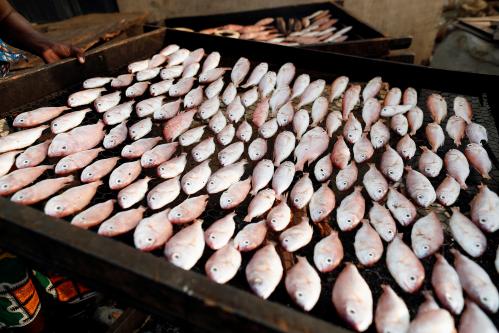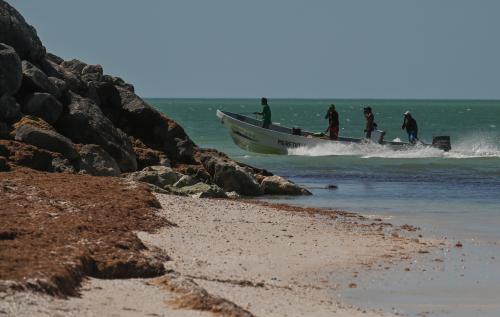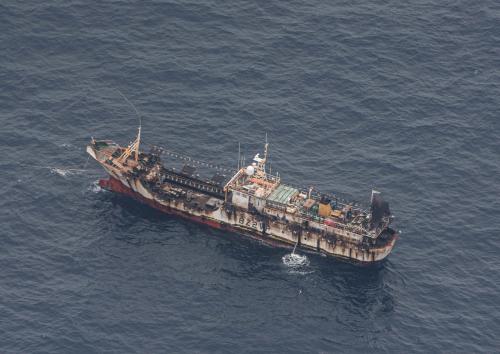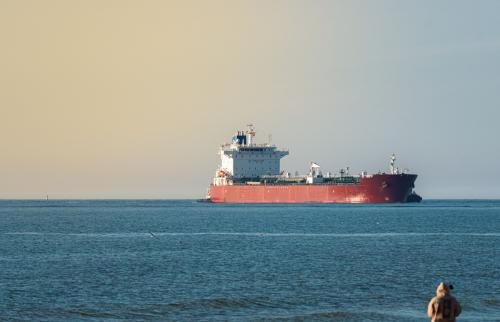On October 11, the U.S. Coast Guard established an Illegal, Unreported, Unregulated (IUU) Fishing Center of Expertise in Hawaii which “will serve as the international engagements arm for combatting illegal fishing activities in the Indo-Pacific, and further promote regional coordination to combat IUUF and better equip partner nations.”
The impact of illegal fishing
IUU fishing includes numerous practices that adversely affect fisheries worldwide. According to the United Nations Food and Agriculture Organization, aquatic foods provide 17% of animal proteins consumed globally and a significantly higher percentage in many island nations and developing countries. Those fisheries are at risk; as of 2019, 35.4% of global fish stocks are overfished (compared to 10% in 1974), and an additional 57.3% are being fished at their maximum sustainable level. In other words, nearly 93% of fish stocks are being exploited at or above their sustainable limits.
IUU fishing undermines international fisheries management efforts, placing global supply at greater risk. In addition to its ecological and food security implications, it amounts to stealing from a global industry with first sales of $406 billion annually. It is also dangerous, associated with forced labor and human trafficking, and linked to transnational organized crime.
Supporting U.S. strategic efforts
Establishing the center of expertise follows through on a commitment from the Biden administration in its June 2022 Memorandum on Combating Illegal, Unreported, and Unregulated Fishing and Associated Labor Abuses. On the first anniversary of the memorandum, the administration announced the then-forthcoming center, to “bolster partner engagement, capacity, and resilience.”
It also supports the national five-year strategy prepared by the U.S. Interagency Working Group on IUU fishing in October 2022 and represents a significant milestone for the Coast Guard’s IUU Fishing Strategic Outlook and Implementation Plan, published in September 2020 and July 2021, respectively.
A focus on partnerships and agreements
At a recent public event, Admiral Linda Fagan, commandant of the Coast Guard, highlighted the importance of partnerships and bilateral agreements to counter IUU fishing and illustrated the international appetite for more agreements. The new center is positioned to act on this, serving as a focal point for efforts to establish and exercise them.
Admiral Fagan’s focus on partnerships and agreements is appropriate. The Coast Guard has decades of experience leveraging bilateral and multilateral agreements to combat drug trafficking in the Caribbean and Eastern Pacific. Counternarcotics operations and efforts to stop illegal fishing have a lot in common: both start with the challenge of maritime domain awareness — the need to spot nefarious activity over large swathes of open sea.
Building on counternarcotics experience
In both cases, vessels often try to exploit the territories of nations that lack the resources to safeguard their waters. Countering IUU fishing and stopping drug trafficking also require expertise in detection and monitoring, boarding and searching vessels, and the development of detailed cases to support legal action. These parallels mean that experience built across decades of counternarcotics operations provides a relevant foundation for approaching IUU fishing.
The Coast Guard currently exercises bilateral law enforcement agreements with over 40 nations, with a variety of provisions that support counternarcotics activities. One of the most wide-ranging is the comprehensive maritime agreement with the Commonwealth of The Bahamas, signed in 2004. It provides for a shiprider program where Bahamian law enforcement officials embark on U.S. vessels and aircraft and grant those vessels and aircraft authorities to assist in enforcing Bahamian laws.
The agreement also includes provisions for vessels and aircraft to patrol Bahamian territorial waters, and to stop, board, search, and detain non-Bahamian vessels (without a shiprider), with the Bahamas reserving the right of disposition should violations be found. Among other provisions, it also supports bilateral information sharing and provides a framework for the use of force to stop non-compliant vessels.
While the agreement with the Bahamas is one of the most extensive, many of its provisions are present in those with other nations. Broadly, they all reflect the notion that the United States and the Coast Guard have the capacity, technical expertise, and experience conducting counternarcotics operations that most nations’ maritime forces lack. They also allow the United States to support maritime domain awareness for countries without reconnaissance capabilities. The Coast Guard’s reputation for professionalism and training, along with its history of respecting the sovereignty of the countries that it works with, helps to make it a preferred partner.
For nations averse to signing formal agreements with the United States, the Coast Guard works to establish mutually-agreed-upon operational procedures to normalize actions when faced with counternarcotics cases linked to that nation. These procedures remove ambiguity, promote coordination, and expedite action on cases that would otherwise be complex jurisdictional challenges with states that may not normally have amicable relationships with the United States.
Despite the focus on current counternarcotics agreements in the Western Hemisphere, similar mission requirements and assistance provisions make them relevant to IUU fishing partnerships worldwide. The Coast Guard already has agreements in place with 12 Pacific Island Nations (as well as several nations in Africa, another IUU fishing hotspot) to counter illegal fishing. In Oceania, the Coast Guard often exercises these agreements under the umbrella of Operation Blue Pacific, designed to strengthen relationships with partner nations through Coast Guard cutter deployments.
Partnerships in action
Bilateral and multilateral agreements have already helped Pacific Island nations protect their waters from IUU fishing. Notably, in 2020, the Palau Division of Marine Law Enforcement dispatched its Australia-provided patrol boat and worked with a U.S. Coast Guard aircraft and cutter to interdict an 80-foot Chinese vessel fishing illegally off Palau’s Helen Reef.
A joint Palau-U.S. Coast Guard boarding supported an investigation into the Chinese vessel’s actions, ultimately leading to a settlement deal in lieu of charges and the vessel and crew’s return to China. This case highlights how the Coast Guard’s maritime expertise assists partner nations in protecting their waters and shows that enforcement action against IUU fishing is possible, even when the poachers are from a nation that is not party to regional multilateral agreements.
Expanding the scope of current partnerships, signing agreements with additional nations, and adopting provisions that make criminal prosecution possible can counter the challenges presented by IUU fishing. While the nations whose fishing fleets are the largest offenders seem unlikely to sign formal agreements, the model of mutually-agreed-upon operational procedures may provide a way forward.
A whole-of-government approach
It is important to note that these agreements are not a product of the Coast Guard alone. The Department of State is critical to these efforts. Its role alongside the Coast Guard and the National Oceanic and Atmospheric Administration in leading the Interagency Working Group on IUU Fishing, created by law in 2019, has been instrumental in aligning U.S. efforts. This is a large and growing endeavor and could be expanded to include other interagency constructs.
A whole-of-government approach is essential due to the complex nature of the IUU fishing problem and the Coast Guard’s limitations. The service is working to expand its capacity to support partnerships in the Pacific, but it is currently stretched very thin. Its Hawaii-based 14th District, for example, has an area of responsibility of over 14 million square miles, including nearly half of the United States’ 3.4 million square nautical mile Exclusive Economic Zone.
With fewer than a dozen cutters and four fixed-wing aircraft, the 14th District must patrol that vast area and conduct an array of diverse missions beyond IUU fishing, such as search and rescue. Recently, the Coast Guard has added liaison positions across the region and announced plans to move cutter Harriet Lane from Virginia to Hawaii. The service and the broader Interagency Working Group should continue to seek creative solutions to build U.S. capacity to support an expanding slate of international partners.
An important step
Overall, this effort to establish and exercise bilateral agreements seems small against the massive IUU fishing problem. In many ways, it is. Truly addressing IUU fishing will require a coordinated global effort that enforces fisheries management measures, removes the economic incentives for illegal fishing, and requires flag states to effectively regulate their distant water fishing fleets. While some domestic and international progress has been made in recent years, these objectives are broadly out of reach and will likely remain so for the foreseeable future. For this reason, even limited efforts are important and impactful.
Coast Guard partnerships enable enforcement and develop organic capacity in nations whose waters were previously unprotected. This has the effect of deterring illegal fishing in an ever-growing area, improving collective maritime domain awareness, and building up a broad coalition of capable nations that can contribute to global efforts to identify and address illegal fishing. Fundamentally, establishing the IUU Fishing Center of Expertise is a step in the right direction and provides a focal point for multilateral efforts, at a time when those efforts are most needed.
The Brookings Institution is committed to quality, independence, and impact.
We are supported by a diverse array of funders. In line with our values and policies, each Brookings publication represents the sole views of its author(s).








Commentary
Coast Guard Pacific partnerships push back against illegal fishing
November 30, 2023